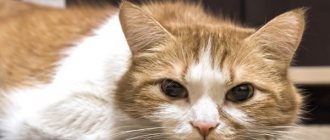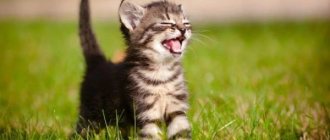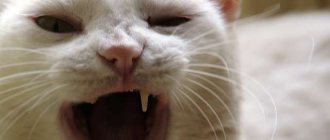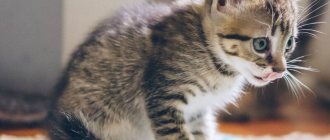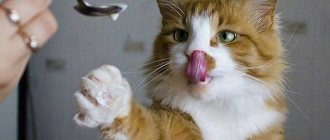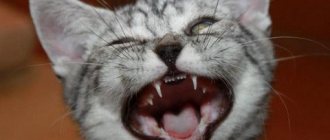If your kitten is lethargic and sleeps constantly, there is no need to panic. A healthy pet sleeps almost the whole day during the first month of life, waking up to eat and play a little. Adult cats are already awake 7-9 hours a day. They spend time playing, hunting and communicating with their owners.
A cat may sleep constantly not only because of pain or loss of strength. Factors that influence sleep duration :
- heat, low atmospheric pressure;
- home comfort and calm atmosphere;
- high activity while awake;
- dense feeding of the pet;
- Age: Old cats and young kittens can sleep up to 20 hours a day.
© shutterstock
If the kitten is active and eats well when it wakes up, there is no need to worry. Prolonged sleep is physiologically normal, since protein nutrition of animals requires long-term digestion.
Features of long sleep in kittens
Many pet owners know that cats are real sleepyheads and spend most of their time sleeping in a secluded place. This is a characteristic habit of animals accustomed to hunting at night. Domesticated cats do not require the constant vigilance of their wild relatives, so they can spend up to 18 hours sleeping every day. This behavior allows them to fully digest the protein food they eat, and also maintains health and saves energy for the active period of wakefulness.
Changes in sleep depending on age
Experienced felinologists know that the duration of a cat's sleep varies depending on the age of the individual. The approximate duration of rest is as follows:
- Kittens up to three weeks sleep 22-23 hours, and wake up only to eat.
- Month-old babies have been resting for 20-21 hours, and spend the rest of the time exploring the world and playing their first games.
- Kittens from two months sleep for 18-20 hours.
- Adults are in the arms of Morpheus for 14 to 16 hours, which is considered the norm.
- Old animals sleep on average 22 hours, and wake up only to eat, go to the toilet and take a short walk or be close to the owner.
Sleep is an important component of a cat’s life, without which it will not be able to please its owners, frolic, run and hunt. A full, long rest, not accompanied by a lack of appetite and lethargy, is the key to health and longevity.
What else affects sleep duration?
In addition to age, other internal factors, as well as some external ones, influence individual sleep duration. Because of this, pets of the same age require completely different amounts of time to rest.
Satiety
If a cat sleeps peacefully all day, then he does not feel hungry. He uses all this time to digest food. Animals that eat high-protein foods rest especially long.
Physical activity
The energy spent during outdoor games is restored during sleep. But this does not mean that the main couch potatoes are energetic and playful pets. In their case, the time of falling asleep coincides with the end of the game. Having recharged, they are ready for new adventures.
External (including weather) conditions
The calmer, more comfortable and quiet the environment in the room, the easier it is for the animal to fall asleep. Pets sleep the longest when their owners are away. If you install hidden cameras, you can see that the mustachioed pets get up just to drink water.
Sleep duration increases during rainy weather and hot summers. If your pet rests for a long time during the heating season, then dry air is to blame.
Some animals are sensitive to weather conditions. If it’s gray and rainy outside, the pet will sleep almost all the time, except for feeding and going to the toilet.
Breed
The character traits of different breeds are no less important. Persians, Ragdolls, Devon Rexes, Britons and Scots sleep the longest. They are quite lazy and often fall asleep immediately after eating.
More active breeds include Abyssinians, Siberians, Bengals, Siamese, Kurilian Bobtails and Egyptian Mau. Representatives of these breeds love active games with their owner and hunting, so with enough attention they are constantly on the move.
Health status
Representatives of the cat family are good at capturing other people's emotions. A quarrel between beloved owners can cause them great anxiety and worry. When under constant stress during a move or other exciting event, they will hide in secluded places and sleep longer than usual. Also, the reason may lie in the disease.
What not to do when your kitten won't sleep at night
Sometimes owners driven to despair resort to not entirely humane methods in order to get at least a little peace:
- When a pet does not allow you to sleep at night, it happens that the owner, trying to calm the animal, locks it either in the bathroom or in another room. In this way, it will not be possible to accustom a cat to rest at night, because it will begin to run around and scream even more, not understanding why it was treated so unfairly.
- When the owner, dreaming of a night's sleep, sprays the pet with water, he, of course, gets the long-awaited rest, but not for long until he licks himself. He won’t do this for a long time, then the noise will start again. The cat does not feel guilty; such methods seem offensive to him.
- Sometimes the owner follows the cat’s lead and begins to play with it, caress it, and feed it. In no case should you act this way; she will get used to it, and then life will become even more fun.
You can try covering the windows in the house with heavy curtains at night, this way the morning will take longer for the cat, and the owner will have a little extra time to soak in bed.
When a healthy cat does not allow its owner to rest peacefully at night, this means that it cannot adapt to the human regime in any way, but lives under the influence of natural instincts. If the pet is not sleeping, then the owner must behave calmly and competently.
When a person behaves aggressively towards an animal, it will be even worse, firstly, the cat will be offended by such behavior and will become even more indignant about this. Secondly, everything that happens will only amuse him, because he has achieved what he wanted: the owner’s attention. Over time, cats will calm down and become less playful; you need to endure a little and retrain your pet to your rhythm of life.
After sterilization
It should be noted that after sterilization surgery, the cat does not eat and sleeps all the time; this is a normal state after anesthesia. If this period lasts for 24 hours, then there is nothing to worry about. If a day has passed and the condition does not change, you need to urgently see a veterinarian.
During the first 24 hours, you don’t need to force the cat to get up or wake him up if she doesn’t want to. Just like insisting on food and drink. Give her a little rest, recover, and she will again delight you with her cheerful appearance.
If the anesthesia has not worn off and the cat is not sleeping, gets up and tries to move around the apartment, do not let it out of sight so that it does not accidentally get injured. It’s better to take her in your arms, calm her down, and maybe she’ll fall asleep. Sleep is the best medicine here.
What diseases cause kittens to sleep for a long time?
Unfortunately, often the drowsiness of pets is not related to their physiological characteristics. Lethargy, decreased activity and too much sleep can be a sign of a number of dangerous diseases:
- parasite infestation; fleas, ticks, helminths;
- intoxication (food poisoning);
- intestinal obstruction;
- injuries: bruises, fractures, dislocations, sprains;
- urolithiasis;
- anemia;
- gastritis;
- leukemia;
- kidney inflammation;
- retroviral infection.
Associated symptoms. Typically, these diseases are accompanied by other alarming symptoms:
- weakness in the limbs;
- hyperthermia (increased body temperature);
- lack of appetite;
- refusal to drink;
- dry, rough nose;
- dullness and brittleness of wool;
- weight loss;
- lack of activity even during short-term wakefulness, while the awakened kitten does not play and does not respond to the owner’s calls.
All of the above changes are extremely dangerous for the kitten’s life and it is unlikely that he will be able to solve the problem with sleep. The situation requires the mandatory intervention of a veterinarian, competent diagnosis and treatment. Experts recommend not to hesitate and immediately seek professional help.
How and where is the most comfortable place for a cat to sleep?
The pet chooses a secluded, quiet and peaceful place to sleep, where no one will disturb him. It is worth purchasing a house with soft walls and a bottom. Here the cat is comfortable and safe. But it has been correctly noted that cats can comfortably sleep almost anywhere. If an animal feels safe, well-fed, and healthy, it will definitely not have any problems finding a place to sleep.
Observing behavior, owners ask questions related to their cats' sleep. For example, why does a cat sleep with its eyes open? If this is noticed, you should not frighten or wake the animal. This natural state for a cat's sleep is indicative of a shallow, pleasant slumber, especially in older pets.
Sleeping with your eyes open, accompanied by symptoms of paralysis, should alert you. It is dangerous if the animal’s eyes become cloudy, convulsions are observed, and the breathing rhythm is disrupted.
A cat loves to sleep on its owner's stomach for a number of reasons. In some cases, she may feel early pregnancy. Some furry owners say that the animal sensed pregnancy before they knew about it themselves.
Sometimes the cat tries to improve the owner’s well-being in this way. It is possible that the furry one intuitively senses health problems. Some owners and even experts are confident that a cat lying on its owner’s stomach can relieve stress and improve his mood. In this case, the animal tries to position itself closer to the solar plexus.
Why does a cat sleep on its head? Many people think that this is a bad sign. In fact, in this way she is trying to express her devotion and love for the person. The cat may feel a headache and makes attempts to relieve it.
Sometimes the cat begins to exhibit strange behavior, which raises some questions for the person, such as why the cat sleeps in the litter box. This can happen for a number of reasons:
- has difficulty using the toilet, has problems with urination;
- does not have a secluded place to sleep;
- it's just a bad habit that needs to be broken.
In the first two cases, you should contact a veterinarian. In other cases, it will be enough to provide your pet with a comfortable place to sleep, taking care of its convenience and comfort.
A cat sleeps on its back for a number of reasons:
- the ambient temperature is too high and the animal is simply too hot;
- love and trust in the person and everyone living in the apartment;
- problems with organs located in the groin area;
In the latter case, it is worth observing the animal, its behavior, and whether the cat is experiencing difficulties with urination. In case of deviations, you should seek veterinary help.
Other pathologies
In addition to the listed pathological conditions of cats, accompanied by lethargy, drowsiness and loss of appetite, the following painful conditions also occur:
- disturbances in the functioning of the endocrine system.
For example, after sterilization or childbirth due to hormonal imbalance, cats become lethargic and inactive.
Pets suffering from diabetes also do not want to move too much. In addition, such cats are constantly thirsty, eat a lot or very little, and often go to the toilet. They experience weight fluctuations, their vision deteriorates, their stomach enlarges, their muscles weaken;
- oncological diseases.
One of their symptoms in cats is a lethargic state. Changes in the pet’s well-being are clearly visible: the cat hardly eats, lies down all the time, vomits, and experiences internal bleeding. Such animals have very unpleasant breath, and upon visual examination, swelling and ulcers can be detected on the body;
- diseases of the musculoskeletal system.
Even an inexperienced owner can easily recognize them. With arthritis, dislocations, sprains, osteochondrosis, fractures and other problems, animals become lethargic, try to eat and move less. Cats' affected joints swell, they limp, rarely sharpen their claws and wash themselves. All movements cause them pain;
- complications after surgery.
Usually, in the first three days after the intervention, cats are very lethargic. This condition, in the presence of appetite and thirst, is considered normal.
But, if the animal’s temperature rises, blood or pus begins to ooze from the wound, vomiting or constipation often occurs - you need to contact the clinic as soon as possible. After all, these can be dangerous symptoms of suture dehiscence or suppuration, or the formation of a hernia.
Possible causes of lethargy in healthy animals
Often there are reasons why a cat is lethargic, sleeps all the time and eats little, but it is better to understand each of them in order.
Stress
It is not uncommon for a cat to eat poorly and sleep a lot after a serious nervous shock.
Cats are very sensitive animals, so they have many causes of stress:
- travel by car;
- the arrival of a new family member or pet in the house;
- change of owner;
- repair or rearrangement of the house;
- visit to the veterinarian;
- change of place of residence by owners;
- lack of attention from the owner;
- pain;
- recent surgery;
- visit of guests;
- bathing and other hygiene procedures;
- changes in daily routine;
- the appearance of new and unusual objects in the house;
- first time on the street.
Usually cats cope with this situation quite well without medical help, but they really need the support of their beloved owner. However, in some particularly susceptible cats, stress lasts for quite a long time and can even be harmful to health.
The main physiological signs of nervous shock in a cat:
- urinary incontinence;
- rapid breathing;
- diarrhea or constipation;
- increased cleanliness (a cat can lick itself until bald spots appear on its fur and irritation on the skin);
- yawning too often;
- urinating in inappropriate places (the cat is marking its territory).
It is important! If, as a result of stress, the cat’s behavior does not return to normal for a long time, it is better to show the animal to a doctor. After all, nervous shocks can negatively affect his health and lead to the development of diabetes, skin diseases and disturbances in the functioning of the cardiovascular, digestive and genitourinary systems.
Change of feed
Often the cause of a lethargic state and refusal to eat is a change in diet (for example, switching from natural food to ready-made food and vice versa).
In this situation, you should return the cat to its previous food and treat it with some treat. Then the restoration of appetite and a cheerful state will occur very quickly.
Hot weather
Cats do not have sweat glands. They do not know how to cool themselves by opening their mouths, like dogs. Therefore, in the heat, to protect themselves from overheating, furry pets try to lie more in cool places. In addition, they begin to eat less so as not to waste energy on burning calories received with food.
Age
Over time, many owners begin to worry that their once active and nimble cat has become lethargic, eating almost nothing and lying around all the time. This is easy to explain: older cats no longer have as much energy for play; they sleep longer and more soundly than young animals.
If an elderly pet is lethargic, eats without appetite and sleeps a lot, but at the same time drinks water and has the above signs of a healthy cat, then there is no need to worry. However, an older cat should be regularly taken to the veterinarian for examinations to prevent the development of diseases.
Kittens spend almost 90% of the day sleeping until they reach two months of age. If the kitten is lethargic, plays little and eats poorly during periods of wakefulness, then the best solution is a trip to the veterinarian.
It is important! The maximum duration of healthy fasting for kittens is 1 day, for young cats and middle-aged pets – 3 days, and for “old people” – 2 days. If after this time the cat still does not start eating, you need to consult a doctor as soon as possible.
Pregnancy
In the early stages of pregnancy, many cats, like people, suffer from toxicosis. They become lethargic, try to move less and more carefully, sleep more and often refuse to feed.
If a cat was mated 3-4 weeks before this condition, then after another 5-6 weeks you can expect an addition to the cat family.
Rapid breathing as an alarming symptom
If several hours, or even a day, pass, and the kitten continues to breathe frequently, you need to take action. Under no circumstances should the situation be ignored. In adults, rapid breathing is often a sign of cardiovascular pathologies, but in kittens this is a rather rare occurrence.
After all, he is a young body, and his heart is still strong. However, there are plenty of other serious factors that cause disruptions in the functioning of the respiratory system. Among them:
- Poisoning. Ignorant babies put everything in their mouths, and there is a risk of swallowing something toxic. In addition, the baby can be poisoned by spoiled food. If this happens, the kitten breathes heavily and frequently, in addition, he is apathetic, lethargic, loses his appetite, and does not want to play. Vomiting and loose stools are often present. These symptoms are especially dangerous, because a small body quickly becomes dehydrated, which can be fatal. The kitten should be given water and not hesitate to contact a veterinary clinic.
- ARZ, ARVI. These sores cling not only to human cubs, but also to felines. The airways become clogged with mucus. As a result, the kitten breathes rapidly, trying to take in more air, which is difficult to reach the lungs. Usually with the mouth open, since the nasal passages are blocked. These ailments are accompanied by nasal discharge, cough, and increased body temperature.
- Bronchitis. With it, the kitten also breathes frequently and very noisily. There is a cough and it is usually dry. You can hear wheezing in your chest. Temperatures rise to high levels.
- Allergy. It causes swelling of the larynx, which prevents normal air flow. Therefore, the kitten breathes frequently.
- Inflammation of the nasopharynx. It may be caused by some viruses or bacteria. The kitten's rapid breathing is accompanied by whistling sounds and noisy snoring.
- Foreign object in the respiratory tract. This is a very common reason, especially for those babies who are just learning to eat on their own. A fluffy who does not calculate his strength and grabs too large a piece can easily and simply choke. The kitten needs to be saved: open its mouth as wide as possible and try to get the foreign body out. If this does not help, turn the animal upside down and, holding the hind legs, press on the stomach in the area of the diaphragm. Usually after such manipulations everything pops up.
- Injuries to the ribs or muscles. Sometimes their consequences are not visible to the naked eye. The fact that the kitten often breathes with its stomach in its sleep may be the only symptom. You need to carefully examine the baby's body. If there is an injury, he will not allow himself to be touched, as it hurts. He can also take unnatural positions, sleep in only one position, etc. The animal needs immediate medical attention.
There are other, more rare reasons for a kitten to breathe heavily and frequently. If time passes and the baby does not get better, you should not try to look for them yourself and risk your pet. It is better to show the baby to the doctor, find out the diagnosis and take adequate therapeutic measures.
How long should a kitten sleep?
In the first month of life, small, still blind kittens sleep about 23 hours a day. In the second month, the waking time increases to 6 hours, and by six months the animals adapt to the adult regime, and they spend about 16 hours sleeping. They sleep mainly during the day, because cats prefer to play at night. This is the norm for healthy cats in good health.
At 3 months, the normal amount of sleep for a kitten is 18 hours.
Sleep standards
While the child is in infancy, he does not have a daily routine. There is no need to force your child to sleep if he doesn’t want to. And, accordingly, there is no need to wake him up if the newborn sleeps a lot. The baby himself knows how much sleep he needs. Average sleep standards for children under one and a half years old are presented in the table.
| Age | 1-2 months | 3-4 months | 5-6 months | 6-12 months | 12-18 months |
| Sleep per night | 18 hours | 17-18 hours | 14-16 hours | 13-14 hours | 10-13 hours |
For the smallest children, daytime and nighttime sleep are approximately the same in duration. The older the child gets, the more stable night's sleep becomes. The long daytime one is replaced by one or two shorter ones. Concern may arise from the deviation of the data presented in this table by 4-5 hours plus. Then we can assume that the newborn sleeps a lot, and there is a reason to contact a neurologist.
Long sleep and its causes
There are several reasons for prolonged sleep. If they are not associated with general lethargy and refusal to eat, then they are considered normal.
Cats are naturally very active. It is vital for them to replenish their strength and sleep is the best medicine for this.
Again, returning to natural premises, it should be noted that in nature, cats are predators. Their main diet consists of food rich in proteins. Pets also eat mainly protein foods, which require a long time to digest.
After sterilization, your cat may sleep longer than usual.
Is this always a sign of illness?
The main reason that a cat sleeps very often or constantly is that it actively spends time while awake, which requires significant energy expenditure. A prerequisite for long-term rest is the animal’s nutrition: protein foods require long-term digestion, and this is only possible in a relaxed state. Other causes of prolonged napping include:
- The season of the year or the ambient temperature, for example, in the heat, pets will sleep much longer, due to which thermoregulation is normalized and the risk of overheating is reduced.
- Age – young kittens and older animals need more time to rest.
- The satiety of the animal - the higher it is, the more sleepy the kitten will be.
- Home environment – in a calm and serene environment, cats sleep much longer.
- Health status.
Neutered or overweight animals may rest much longer due to their slower metabolism.
Causes of drowsiness in kittens
In addition to natural physiological reasons, the duration of a cat’s sleep is influenced by external factors:
- Lifestyle;
- nutrition;
- weather;
- presence of irritants.
Kittens sleep longer if they are fed and have played a lot. Prolonged sleep is needed to fully recuperate. A short period of wakefulness on hot, sultry days, before rain, when atmospheric pressure decreases, the level of nitrogen in the air increases. Hormonal levels influence sleepiness. Females sleep longer. In addition, the activity of pets directly depends on the breed. If the kitten sleeps a lot, but during the waking period shows normal activity and looks completely healthy, there is no reason to panic. When the baby grows up, gains strength, changes his lifestyle, the regime will change.
Actions for drowsiness in kittens
In the absence of pathological reasons, you can ensure normal development of the baby and shorten the duration of sleep as follows:
- choose the right diet;
- avoid overeating or starvation;
- protect from external noise;
- arrange a place to sleep;
- do not disturb during sleep;
- watch out for small children who may harm kittens;
- provide access to fresh air in the apartment or house;
- carry out preventive protection against helminths and fleas.
If the cat constantly sleeps, looks sick, refuses to eat, or has other alarming symptoms, it needs to be shown to a veterinarian.
At an early age, not all animals are the same, even if they were born by the same mother. Strong babies quickly adapt to the external environment and new nutrition, while weak ones require more effort. If a kitten sleeps for a long time and plays little, this does not mean that he is sick. The main indicator of health is a good appetite. In this case, food should be nutritious and age-appropriate. Mature kittens aged about 4 months can sleep for a long time during the day due to their nocturnal lifestyle. If the baby is raging, rolling up rugs, at night, during the day he regains his strength. Purrs that live outside come into the house occasionally and sleep less than their indoor relatives.
Why might a newborn sleep too much?
There are a number of reasons why a newborn sleeps a lot.
1. Pharmacology during childbirth. In the case of complicated, protracted labor, during which the mother was given any drugs, the baby through the general bloodstream receives a dose of drugs that affect its activity in the first hours and days after birth. In this case, the baby sleeps a lot and skips feedings.
2. Incorrectly organized feeding process. A baby who latch onto the breast incorrectly due to the shape of the nipple or an awkward body position spends too much energy trying to get food and falls asleep from fatigue, remaining hungry. If your child is not gaining weight well and is inactive, you should definitely consult a breastfeeding specialist to rule out this problem.
Problems can also arise when there is a strong flow of milk, which causes the breasts to become hard. In this case, it is enough to express some of the milk so that the nipple and the area around it become elastic.
3. Environment. Contrary to the belief that newborns require silence and the absence of bright light to fall asleep, it is easier for babies to fall asleep in a noisy environment - this triggers a protective mechanism that protects the nervous system from overload.
This means that in a house where the TV is on or music is playing all the time, people are talking, noisy household appliances are regularly turned on, the baby will constantly want to sleep. At the same time, his sleep is restless, his body does not fully rest, which negatively affects his health.
